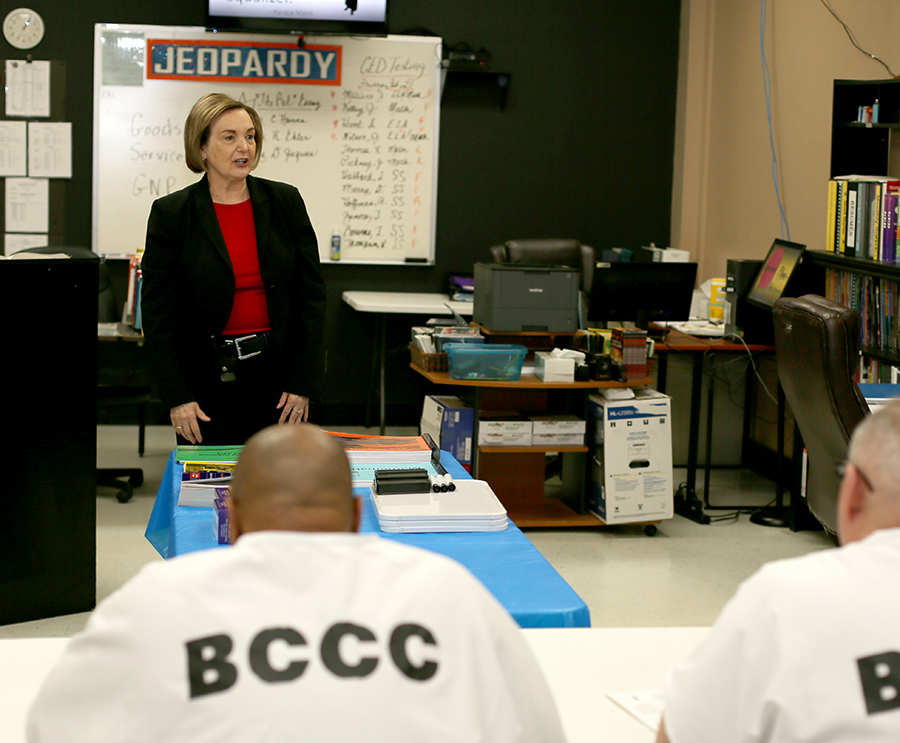Retired Teacher Finds Fulfillment in Helping Inmates Further Their Education
When Gloria Shimanek was asked who were the better behaved students in class – the 11th and 12th graders she taught as a high school teacher, or the inmates she now teaches at Bowie County Correctional Center (BCCC) in Texarkana, TX – her reply came quickly: “Absolutely the inmates.”
Shimanek, who retired from the Pleasant Grove Independent School District after a 30-year career teaching business, marketing and social studies classes in rural, suburban and inner-city schools in Wisconsin and Texas, has been the lead educator at BCCC since 2015. She typically works with 60-70 inmates a week to help them achieve their General Educational Development (GED) certification.

“I wanted to do something that contributed to the community in a positive way and I thought ‘what better way than to help inmates further their education?’” Shimanek said. “I find it very rewarding. Many times I find that the inmates are extremely bright, some are even brilliant, but they did not get the support they needed to finish high school. If they have someone who really cares and is supportive about their future they are so thankful and appreciative. They are extremely respectful and they get a great deal of personal satisfaction and fulfillment out of learning.”
To get their GED certification, inmates must score a minimum of 145 in four different subjects: English, Math, Science and Social Studies. Shimanek said her students range in age from 19 to 70, with educational aptitudes ranging from elementary to “brilliant,” with some able to reach their certification in a matter of months, while others needing years.
“It’s a fluid situation, with inmates being transferred to other facilities and new inmates coming in, so a student might pass two of their tests while in another facility and then come here and pass the other two,” Shimanek explained. “LaSalle Corrections (which manages BCCC) pays for all the resources, learning materials, testing fees and computers, so the students are very motivated to do the work in here so they don’t have to pay for it out of pocket when they get out.”
LaSalle Corrections also took the steps of making BCCC a certified testing center with an on-site proctor so inmates wouldn’t have to travel offsite for their testing, which is offered monthly.
“Most employers require a high school diploma or GED. With this certification they can also enroll in college or vocational or technical schools, so it can have a huge positive impact on their lives,” Shimanek said.
BCCC Warden Joseph Wilson says Shimanek has helped many inmates turn their life around, saying “Gloria does an outstanding job. She takes her work very serious and is very diligent about making sure her students do their lessons properly. It not only prepares them for employment for when they get out, it also teaches them how to deal with everyday life.”
Helping Shimanek in her efforts are 6 tutors, inmates who she calls “extremely bright” with educational backgrounds ranging from military experience to bachelors degrees to doctorate degrees.
“They also get a lot of fulfillment from being able to help other inmates turn their lives around,” Shimanek said.
Students can attend classes in both the morning and afternoon, work with tutors individually, and they can obtain printed materials to study in their barracks. Motivation incentives and positive reinforcement are used, with coffee offered each class period, periodic graduation celebrations with pizza, cake and soft drinks, and popcorn with movies that promote respect for diversity, holiday spirit, and/or patriotism.
Shimanek said an average of 20 inmates earn their GED every year at BCCC.
In addition to GED classes, Shimanek also teaches other practical classes on learning the Microsoft Office Pro Suite (Word, Excel, PowerPoint and Access) and Employment Skills, which is designed to help inmates develop a re-entry plan. The Employment Skills class includes learning typing and basic computer skills. Students are also taught how to explain their criminal record to potential employers and they learn to identify factors that contribute to an ex-offender’s re-incarceration. The final step in the class is to assist inmates in developing a resume and portfolio to help them secure employment upon release.
Every year LaSalle holds a wildly successful annual poetry contest and participation is high. All entries are sent to their community partner, Dr. Brian Billings and his team at Texas A&M University at Texarkana (Liberal Arts Department), for judging.
Exemplary work is selected for publication in The Aquila Review, the literary journal of Texas A&M University at Texarkana. This is a major source of pride for both LaSalle and the poets. In the last five years, fourteen (14) authors had their poems/prose published.
All 1st, 2nd, and 3rd Place winners receive a commissary award, which is funded by LaSalle Corrections.
“The work that the writers submit is certainly thoughtful,” Dr. Billings, who is a creative writing professor, said. “I have yet to read anything from them that is wholly surface. They pull from personal experience without fail in a confessional manner that only experience can teach.
“The writers often send cards of thanks to my team. Their notes of appreciation stress how much they enjoy having their voices heard by people who take them seriously.”
Shimanek said the greatest reward for her is when one of her students sends her a letter after their release just to let her know things are going well.
“I recently received a note from a student who went in as a young man and was released after 25 years,” she said. “He just wanted to thank me and tell me he had a good job and was recently engaged and his life was going well. You can imagine how happy that made me.”
LaSalle Corrections manages 18 prisons in five states. Warden Wilson said the goal for LaSalle inmate programs is to change lives through the development and implementation of evidence-based and innovative programming solutions.
“Since 97 percent of inmates will be released into society at some point in their lives, LaSalle believes it is imperative to educate and enable those in our care to be successful, productive, law-abiding citizens upon their release,” Wilson said.

